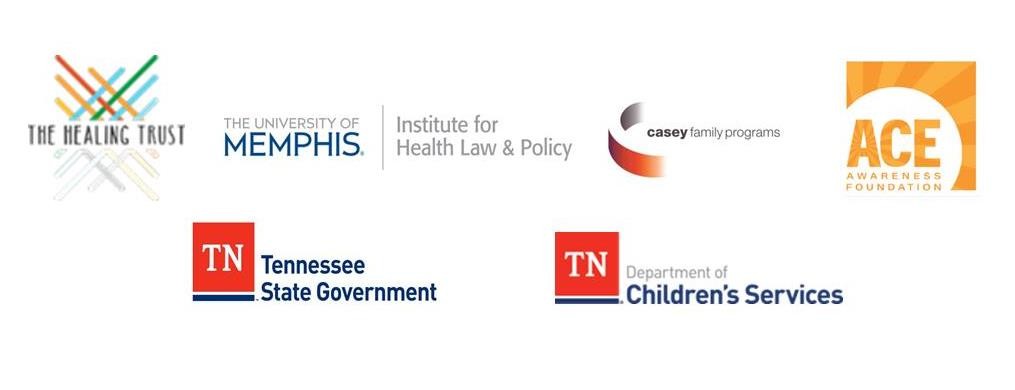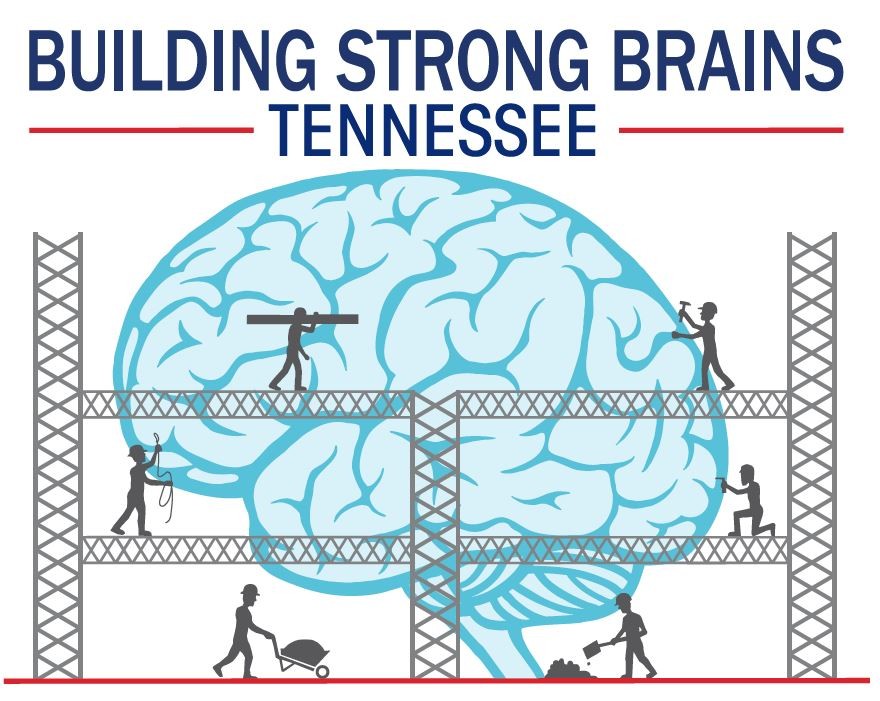Building Strong Brains / TN ACEs
Addressing Adverse Childhood Experiences in Tennessee
Chronic childhood trauma, or what experts call adverse childhood experiences (ACEs), can disrupt a child's brain-building process. Like building a house in a storm or with below-grade materials and tools, ACEs are toxic to brain development and can compromise the brain’s structural integrity. Left unaddressed, ACEs and their effects make it more difficult for a child to succeed in school, live a healthy life, and contribute to the state’s future prosperity — our communities, our workforce, and our civic life.
Building Strong Brains: Tennessee ACEs Initiative is a major statewide effort to establish Tennessee as a national model for how a state can promote culture change in early childhood based on a philosophy that preventing and mitigating adverse childhood experiences, and their impact, is the most promising approach to helping Tennessee children lead productive, healthy lives and ensure the future prosperity of the state.
The Tennessee state initiative is born from research gathered in the CDC-Kaiser Permanente Adverse Childhood Experiences (ACE) Study, one of the largest investigations of childhood abuse and neglect and their effects on life-long health and well-being. The study found that the greater the exposure to things such as domestic violence, addiction, and depression in early childhood, the greater the risk for later-life problems such as the higher risk for chronic illnesses, poverty, depression, and addictive behaviors.
Tennessee is undertaking a comprehensive effort to use this powerful insight to improve the lives of the state’s children. Leaders from the state government, the business world, advocates, insurers, academia, and nonprofit foundations are organized as public and private sector steering groups to guide implementation and provide leadership at the state, regional, and community levels.
The Goals
- Increase the potential that every child born in Tennessee has the opportunity to lead a healthy, productive life.
- Raise public knowledge about ACEs.
- Impact public policy in Tennessee to support the prevention of ACEs and to reduce community conditions that contribute to them.
- Support innovative local and state projects that offer fresh thinking and precise measurement of impact in addressing ACEs and toxic stress in children.
- Seek sustainable funding to ensure the state maintains a long-term commitment to reducing the impact of adverse childhood experiences.
- Embrace open, responsive governance through statewide planning groups and the Three Branches Institute, comprised of leadership from the Executive, Legislative and Judicial branches of government, who were invited by the Governor to form a common agenda to advance child welfare and realign the juvenile justice system.
Projects
- ACEs Funded Projects for Fiscal Year 2022
- ACEs Funded Projects for Fiscal Year 2020
- ACEs Funded Projects for Fiscal Year 2019
- ACEs Funded Projects for Fiscal Year 2018
- ACEs Funded Projects for Fiscal Year 2017
AOF FY24 Recipients
Building a Resilient East Tennessee
Metro Drug Coalition
Target Population: The MDC Obstetrics and Gynecologist Planning and Advisory Board will implement an ACEs pilot project in Knoxville and 13 predominately rural surrounding counties with OB/GYN professionals to enhance the office visit procedures, client follow-up, services, and resources to improve the quality of life for pregnant women with addiction and their baby.
Action Plan: Metro Drug Coalition is poised to develop an academic detailing program for ACEs training and implementation in high-risk OB/GYN practices in the East Tennessee Region. MDC developed a similar toolkit for healthcare providers to assess our targeted population, children, ages 1-12, and teens, ages 13-19. The MDC Practitioners Toolkit was based on the State of California toolkit for practitioners that provides the rationale, questionnaires, and clinic workflow suggestions to establish a protocol that is simple and provides some reimbursement through Medi-Cal (California’s Medicaid program). A toolkit for OB/GYN professionals is imperative to identify the ACEs for high-risk pregnant women as early as possible because of the effects that overactive stress has on the development of their babies’ brains and bodies.
Resilient West Tennessee
Jackson – Madison County General Hospital
Jackson-Madison County General Hospital will collaborate with two partners on this proposal: T.A.M.B. of Jackson dba Aspell Recovery Center and Health Connect America in rural west Tennessee. Through these collaborations, the Applicant proposes to affect a collective impact to achieve population and systems level of change. Women in residential treatment and recovery at Aspell Recovery Center's Kirkland House, Ann's House, and A Mother's Love program for mothers addicted to opioids, other drugs, and their babies will be targeted for the program in Jackson. Aspell's Hardin County Women's Program two locations in Savannah will also serve as a project location. Health Connect America offers mental health and substance abuse counseling for adults and youth at four core office locations in rural West Tennessee. Jackson-Madison County General Hospital will offer a program that is supported by a strong theory of change. The long-term goal is for adults to acknowledge, and understand their own adverse childhood experiences, how these experiences have impacted their relationships, their role as a parent or adults, and what actions they can take to mitigate and prevent further unhealthy habits and behaviors in themselves. The program will promote youth's understanding of their adverse childhood experiences and provide them with tools for building resilience. The project will also provide workshops at community events throughout the region.
With collaborative partners, adults and youth will experience services designed to impact change in their lives from mental health to substance use. This program will further provide an avenue to impact change in the lives of adults and youth.
Supporting Training and Reflection in Early Childhood Mental Health Systems (STARS)
AIMHiTN
AIMHiTN proposes to develop, implement, and carry out Supporting Training and Reflection in Early Childhood Mental Health Systems (STARS). This program will tailor several Infant and Early Childhood Mental Health (IECMH) resources to child welfare professionals and foster parents to support an increase in the recognition of infant and early childhood mental health needs of young children in foster care, support an increase in placement stability, and to promote an increase in reflective capacity which directly correlates to a decrease in vicarious trauma, stress, and burnout.
STARS will develop a dual-track, asynchronous, IECMH Mental Health First Aid (MHFA) curriculum to support child welfare professionals and foster parents respectively in their awareness, recognition of, and response to infant and early childhood mental health needs.
Loudon County Schools and Community Resilience Project, Moving from ACEs to PACEs
Loudon County Schools
Loudon County Health Department, Loudon County Sheriff s Department, and Align9 Prevention Alliance will provide information regarding ACEs and building resilience to the families and individuals they encounter along with Loudon County Schools. Collaborative will pool resources and knowledge to produce a successful media campaign that can be used in other counties and across the state. All partners are members of the Loudon County Health Improvement Council. This 20-member council enables us to benefit from all members' experience and expertise. In addition to media campaigns, toolboxes will be developed and parenting workshops will be conducted.
Afterschool Enhancements for SEL: Pilot Wrap-around Programming in the SEL Supports/SEL Academies at MSCS’s Family Wellness Centers and Pilot SEL Club Programming in MSCS’s Extended Learning Programs
Shelby County Board of Education (dba Memphis-Shelby County Schools)
- Special programming for students – for example, yoga programming provided by the Family Wellness Centers (FWCs) and remotely through satellite activities in the ReSET Rooms of the schools piloting the Social Emotional Learning (SEL) Clubs
- Simultaneous activities for parents during students’ afternoon programming – for example, T.I.P. training accessible in the FWCs and remotely through Microsoft TEAMS
- Removal of barriers for families of participants to participate in FWC activities – for example, bus passes for in-person counseling or provision of private space in the schools piloting the SEL Clubs for families to access telehealth services of the FWCs
- Culminating family events – for example, bus transportation to allow families to participate in a community event aligned with the Five Protective Factors
- Resources to connect program activities to students’ school-day lives – for example, professional development for school-based staff and SEL Clubs’ designation as SEL Ambassadors
Safe and Secure TN
Memphis Family Connection Center
After providing trauma-informed training to organizations in Shelby County for the past decade,
Safe and Secure TN (SSTN) recognized the need to connect organizations to each other in an effort to build a more consistent system of care for the community. Therefore, in 2022 SSTN launched a pilot program called the Shelby County Collective. One to two leaders from each of the organizations participated in practitioner training held locally in September of 2022. They also received coaching from SSTN to support the implementation of trauma-informed strategies. Finally, organizations were given opportunities to encourage, support, and collaborate with each other to scaffold the implementation of new learning. Preliminary survey results indicated that participants felt connected to other organizations in the Shelby County Collective. The Collective's collaborative approach endorsed an affinity for working with other local organizations to pursue a more trauma-informed Memphis community-wide. One collective member said, “I felt it helpful to see the community in Memphis and the various organizations who are pursuing this. I am hopeful for a greater yearning in our city for trauma-informed care."
Based on the successes identified thus far in Shelby County, SSTN seeks to develop similar trauma-informed collectives in additional communities. SSTN has identified Wilson County and Bradley/Polk Counties as the next locations to launch community collectives. Each collective will be led by a local Champion Organization identified by SSTN that has demonstrated a commitment to improving the quality of trauma-informed services in their community. These Champion Organizations are Foster 180 in Wilson County, TN, and OrphanWise in Bradley and Polk Counties, TN. SSTN will provide ongoing training, coaching, and technical support to facilitate Champion Organizations’ implementation of TBRI® through internal policies and practices, as well as the provision of TBRI®-informed services in the community. Further, Champion Organizations will be provided opportunities to collaborate and learn from each other as well as other TBRI® organizations across the nation.
The Hope Collective
The Omni Family of Services
This collaborative proposal is to create a Practice Model, rooted in Hope Science, that can be disseminated to child and family systems throughout Tennessee to prevent and intervene with the impact of ACEs.
The Hope Collective includes established Tennessee service providers of prevention and intervention services for youth and families across the state, an evidence-based Hope framework and training curriculum led by internationally renowned researchers, and a clinically designed, family-focused technology platform for data collection and analysis (TOC XV).
Map of Building Strong Brains Community Innovations
Download a state-wide map listing Building Strong Brains projects across Tennessee.
Learn More
- Building a Trauma-Informed System of Care Toolkit
- Addressing Adverse Childhood Experiences: A Case for Attention and Action in Tennessee
- The Tennessee ACEs initiative overview
- Adverse Childhood Experiences: Prevention, Mitigation, and Recovery Anticipated Multi-Sector, Multi-Level, Public and Private Impacts
- Childhood Stress and Urban Poverty: The Impact of Adverse Childhood Experiences on Health
- The Alberta Family Wellness Initiative: Where Science Meets Real Life
- Finding Your Frame: Translating the Science of Early Adversity for Action
- Announcement of Funding - Adverse Childhood Experiences (ACEs) Initiative
- Additional resources on the Tennessee Commission for Children & Youth website.
- Public Opinion about ACEs
- Building Strong Brains Organizational Capacity and Transformation Report
- Adverse Childhood Experiences: A Public Health Issue Building Strong Brains Tennessee series by WCTE

